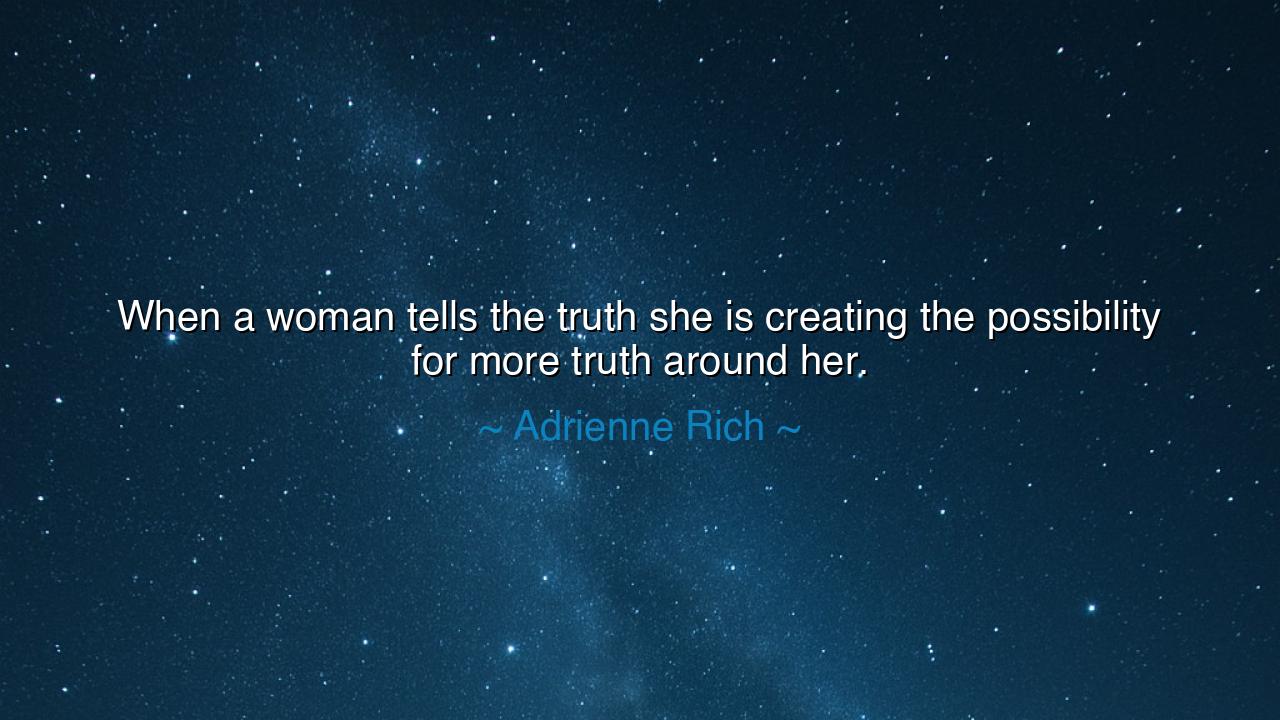
When a woman tells the truth she is creating the possibility for
When a woman tells the truth she is creating the possibility for more truth around her.






The words of Adrienne Rich—“When a woman tells the truth she is creating the possibility for more truth around her.”—echo with the force of prophecy, for they reveal the generative power of honesty. A single act of courage does not stand alone: it becomes a seed, and from it springs a harvest. When a woman dares to speak her truth in a world that has long demanded her silence, she does more than liberate herself. She opens a space, a sacred clearing, where others too may step forward, where silence is broken, where truth multiplies.
The origin of this wisdom flows from Rich’s life as a poet and feminist who lived through times when women were often discouraged from raising their voices. She knew firsthand the weight of unspoken pain and unacknowledged experience. By writing and speaking honestly about power, oppression, and identity, she offered not only her own liberation but also an invitation to others. Her words remind us that truth-telling is not solitary—it is contagious, a fire passed from one torch to another until the darkness itself begins to recede.
The ancients themselves bore witness to this principle. Did not the oracle of Delphi, though a woman, speak truth that kings and generals dared not ignore? Her words, uttered from the depth of silence, shook the fate of nations. Likewise, in every age, when women have dared to tell their truth, the world has shifted. Consider Joan of Arc: a peasant girl who proclaimed that God had called her to lead France. Her truth, spoken against all expectation, inspired an army and changed the course of a war. Though she was martyred, her words continued to echo, creating the possibility for others to believe in what seemed impossible.
History offers us more recent testimony. In 1955, Rosa Parks refused to give up her seat on a segregated bus in Montgomery. That act was more than defiance; it was the telling of a truth—that she, a Black woman, was equal in dignity to any other. Her simple statement of truth ignited a movement. Around her rose voices that had long been silenced, and from her courage came marches, speeches, and victories that reshaped the nation. Her one act of honesty created a space where more truth could breathe and thrive.
Rich’s words remind us that truth-telling, especially by women, has often been suppressed because it is so powerful. Systems of power fear it, for when one voice speaks, others awaken. Silence is the fortress of oppression; speech is the battering ram. When a woman says, “This is my truth,” she is not only testifying for herself but also summoning others out of hiding, reminding them that their voices matter too. The act of truth-telling becomes communal, not solitary.
The lesson for us is profound: never underestimate the power of speaking with honesty. Whether in the halls of power or within the intimacy of the family, one act of courage can ripple outward, loosening the chains of silence that bind many. Truth creates a space for more truth, just as light makes way for more light. By refusing to be silent, you extend permission to others to do the same, and together the world is reshaped.
Therefore, take these actions: when truth burns within you, do not bury it. Speak, even if your voice trembles. Share your story, even if it feels small. Listen to others, and honor the truth they bring forth. Build communities where honesty is not punished but celebrated. For as Adrienne Rich declares, when a woman tells the truth, she creates the possibility for more truth around her—and in that possibility lies the birth of freedom, justice, and transformation for all.






YHYaaa Huii
Adrienne Rich’s words make me think about the healing potential of truth, especially for women. When one woman shares her truth, she can spark a change in the way others think, feel, and speak. But does this process always lead to positive outcomes? What happens when the truth shared is not embraced or is met with resistance? Is the creation of truth always liberating, or can it sometimes be more isolating for the person speaking it?
VTtran van tinh
This quote by Rich makes me reflect on how speaking the truth can create space for others to feel safe sharing their own. However, the idea of creating more truth around us can also be risky. How do we navigate the vulnerability that comes with telling the truth? Is the potential for liberation worth the possible backlash or consequences? I wonder if women are often expected to sacrifice more in order to make room for truth in society.
MMai
Rich's statement highlights the ripple effect that one person’s truth can have. I believe that when a woman speaks truthfully, she sets an example for others to follow, but does that also place an unfair burden on her? Is there an expectation for women to always be the ones to start these conversations, or can others—especially men—also play an active role in creating a more honest and open environment?
THngo thi thu hien
Adrienne Rich’s quote really resonates with me, especially when I think about the impact of women speaking their truth. There’s a certain power in a woman being honest about her experiences, and it often encourages others to do the same. But I wonder—why is it that women’s truths are sometimes seen as less valid or more difficult to accept? Could this reluctance to believe women’s truths prevent a wider cultural shift toward more openness and honesty?